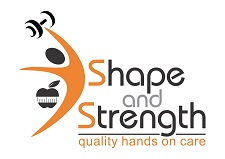Get Relief form Frozen Shoulder at Shape and Strength in south Kolkata.
What Is a Frozen Shoulder?
Frozen shoulder is a condition that affects your shoulder joint. It usually involves pain and stiffness that develops
gradually, gets worse and then finally goes away. This can take anywhere from a year to 3 years.
Your shoulder is made up of three bones that form a ball-and-socket joint. They are your upper arm
(humerus), shoulder blade (scapula), and collarbone (clavicle). There’s also tissue surrounding your
shoulder joint that holds everything together. This is called the shoulder capsule.
With frozen shoulder, the capsule becomes so thick and tight that it’s hard to move. Bands of scar
tissue form and there’s less of a liquid called synovial fluid to keep the joint lubricated. These things
limit motion even more.
Frozen shoulder is generally divided into 3 phases
1-Pain
2-Freezing – Diifficulty in elevating the arm or taking hand behind the back.
3- Thawing- Final phases the shoulder loosens up,the movement are restored.
Symptoms
The main symptoms of a frozen shoulder are pain and stiffness that make it difficult or impossible to
move it.
If you have frozen shoulder, you’ll likely feel a dull or achy pain in one shoulder. You might also feel
the pain in the shoulder muscles that wrap around the top of your arm. You might feel the same
sensation in your upper arm. Your pain could get worse at night, which can make it hard to sleep.
A. You develop a pain (sometimes severe) in your shoulder any time you move it.
B. It slowly gets worse over time and may hurt more at night.
C. This can last anywhere from 6 to 9 months.
D. You’re limited in how far you can move your shoulder.
Causes
It’s not clear why some people develop it, but some groups are more at risk.
Frozen shoulder happens more often in women than men, and you’re more likely to get it if you’re
between the ages of 40 and 60. Your risk might also go up if you’re in the process of recovering from
a medical condition like a stroke, or surgery like a mastectomy that keeps you from moving your
arm.
Certain medical conditions can increase your risk too. You may also be more likely to get frozen
shoulder if you have diabetes. About 10% to 20% of people with diabetes get frozen shoulder. Other
medical problems like heart disease, thyroid disease, or Parkinson’s disease are linked to frozen
shoulder, too.
Diagnosis
A thorough subjective and objective examination from a physiotherapist is usually sufficient to diagnose the frozen shoulder.Investigation such as Ultrasound or M.R.I Scan may be required.
Treatment
Over-the-counter nonsteroidal anti-inflammatory drugs (NSAIDs) like aspirin or ibuprofen can help
relieve the pain and inflammation in your shoulder.
Physiotheraphy is great help in relieving the pain and improving the range of motion and strength of muscle in the shoulder joint.
Physiotheraphy treatment might include :
1-Electrotherapy
2-Ice and Heat Treatment
3-Dry needling
4-Kinesio taping
5-Cupping
6-Postural Correction
7-Exercise to improve flexibility and strength.
If you are suffering from Shoulder pain You may contact Us.
Shape and Strength
16C Bipin Pal Road, Manoharpukur,
Kalighat, Kolkata, West Bengal 700026
Call 9674004799, 033 2466 0510
